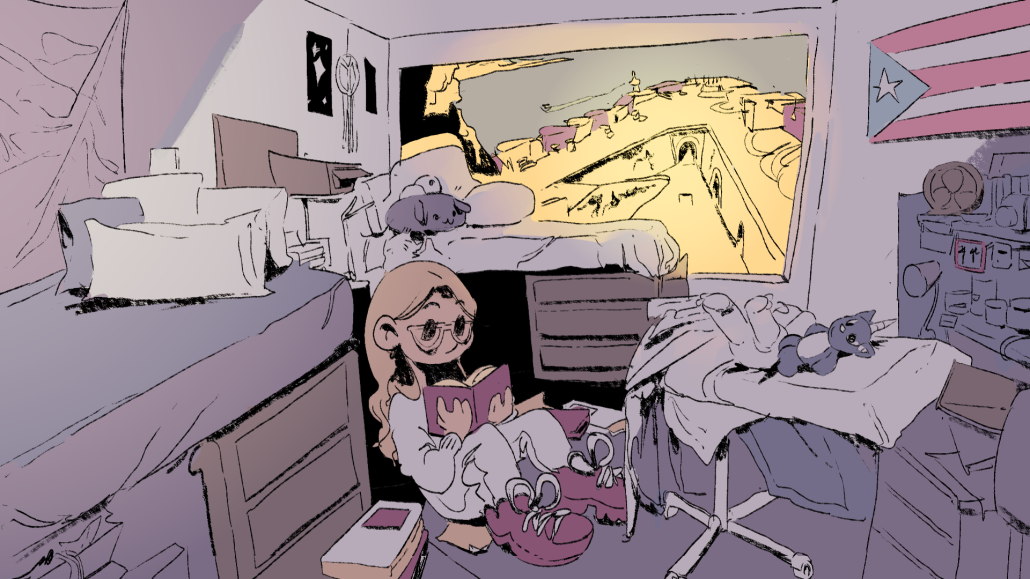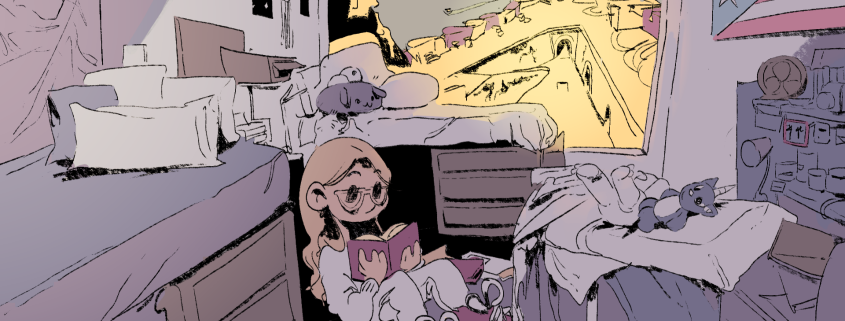Editor’s Epilogue: Lost in translation
Lea este artículo en español aquí.

“Where are you from?” a stranger asks.
“Puerto Rico,” I say, thinking it should be obvious from the flag hanging around my neck.
“What was that?” the stranger asks again.
“Puerto Rico,” I repeat with false calm. I hate having to repeat myself when I’m speaking English. I start to wonder if I’m pronouncing it all wrong and think about how easy it would be to speak Spanish.
“Oh Porto Rico! That’s so cool,” the stranger finally seems to understand with a weird sense of accomplishment.
While I am not a record player that will constantly repeat myself at the will of others, I refuse to purposely mispronounce the name of the island just to make it easier for others to understand me. This also happens when I say my name, although it’s pretty basic. Changing my pronunciation feels like betraying the Spanish language that has given me so much. I’m not going to deny that sometimes I’m a “Bee-ON-ca” away from wanting to catch a plane and get the hell out of here, but I happen to like Los Angeles. These might sound like trivial concerns to some, but as someone who considers words her safety blanket, these are the things that anchor me to myself as I navigate college in a country with a language that is not my own.
Words have always been my loyal companions. I love reading and talking too much; my brain does not know silence. It fascinates me that a word has the ability to hurt more than a physical blow to the face and heal one’s mind and body more than the strongest of medicines. Most of the time, it is difficult for me to vocalize my emotions, but my pen has never failed me. Writing lets me craft my words carefully to say exactly what I want to say — which I can’t do when I’m speaking.
Although I have technically been learning English all my life as part of Puerto Rico’s colonial educational system, I never had to use the language for anything other than devouring books. Turns out that reading too many Rick Riordan and Sarah J. Maas books is not the same as speaking English as my primary method of communication. When I moved to L.A., I realized that even though I knew English, I didn’t know how to exist in the language.
When I decided to study at USC to discover a new world, I had no reference point to navigate moving to a new country on almost the other side of the world at the age of 17. Curiously, the part that has been the most difficult for me to accept — perhaps because it has been the most unexpected — has been losing part of my identity in the translation process from Spanish to English.
Nothing could have prepared me for the shock of navigating a world in a language other than the one with which I grew up. Don’t get me wrong, I’m extremely fortunate to have almost native proficiency in English — at the end of the day, I edit for the Daily Trojan. However, there is a part of me that does not come out when I exist as an English speaker. Perhaps it shows a little sometimes, but less vibrantly than in Spanish. I have anxiety and OCD, so it’s naturally difficult for me to handle new situations and interact with strangers. Adding a new culture and language to this cocktail has been peculiar, to say the least.
As someone who finds a refuge in words, how do I exist in a language where there aren’t enough ways to express everything I am, everything I feel? How do I turn cacophony into symphony? How do I change from a very rich and expressive language to a concise one? In Spanish, I have all my slang, sayings and idioms while, in English, I find myself constantly trying to translate or decorate the language in some way.
I suppose one of the positive things about separating English from my identity is that I can express my emotions more simply, but it comes with the downside of diminishing my feelings as they are translated from Spanish. My English-speaking friends will probably never meet me at my most natural and vibrant self and, while it makes me a little sad, it also motivates me to find little ways to make English my own.
I know that my dilemma with languages is natural and I would never fathom changing my mother tongue, but this does not calm the whirlwind in my head. I am in a permanent state of looking for ways to anchor myself to my identity through words. Listening to music almost exclusively in Spanish, including Puerto Rico in as many projects as I can and even writing this column, are my ways of staying connected to my Latino identity.
Because how do I explain to an American that “te quiero” is not “I love you”? That my Christmas is basically from November to February, that the World Baseball Classic is more important than the World Cup, that a bowl of white rice with a fried egg is a complete meal and that a self-respecting Puerto Rican doesn’t drink Bacardí. Culture has no translation and that is what makes it special, but it is also what hurts the most.
You might be wondering: What’s the purpose of this piece if it doesn’t have a pretty lesson or an inspiring story? I was looking for something much simpler: to open a window into my brain that would allow me to explore my changing identity. It is a love letter to Spanish and a promise to never lose contact with the language that has been my faithful companion for so many years. The reality is that I wrote this more for myself than for the reader. I’m not trying to educate anyone on the experiences of bilingual people — it’s not my job and, if you’re reading the translated English version, it’s a bit ironic either way.
“Editors’ Epilogue” is a rotating column featuring a new Daily Trojan editor in each installment and their personal experiences of living in what seems to be an irrepressible dumpster fire of a world. Bianca Arzán-Montañez is a news editor at the Daily Trojan.

